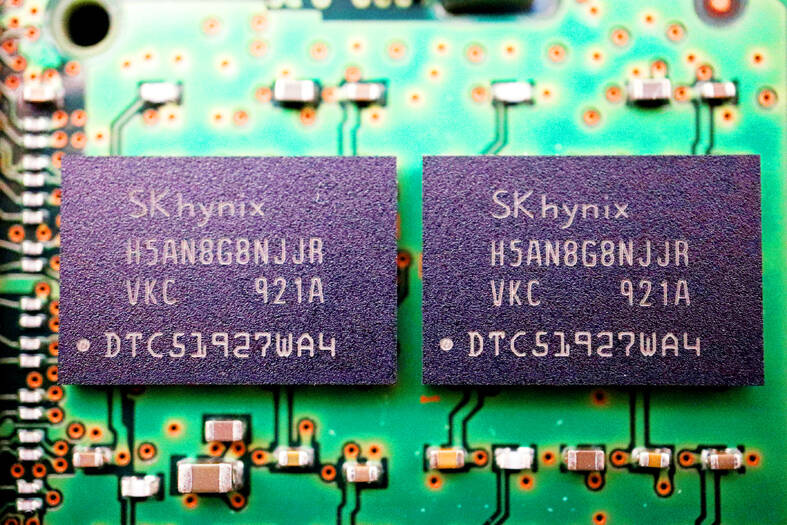South Korea’s semiconductor production last month fell by the highest rate since the global financial crisis, weighing on the nation’s industrial output and pointing to a further cooling of overseas demand for tech components as the world economy slows.
Chip production shrank for a fourth straight month, falling 15 percent from a year earlier in the largest drop since 2009, data released yesterday by Statistics Korea showed.
Overall industrial production contracted 3.7 percent from a year earlier for the biggest fall since the start of the COVID-19 pandemic, the data showed.

Photo: Reuters
The drop in activity speaks to weakening recovery momentum in a nation closely tied to the world economy. South Korea’s growth is already under pressure from falling exports and rising interest rates at home, with the gloomy outlook overseas adding to concerns.
The probability of recessions in major overseas economies such as the US is rising as the US Federal Reserve leads a wave of monetary tightening to combat inflation, and as Russia’s invasion of Ukraine continues.
Although China’s about-turn on its “zero COVID-19” policy suggests its economy might regain strength, a surge in infections would complicate the picture.
The weakening chip demand adds to an array of factors making South Korea’s economic outlook more uncertain, including the implications of a truckers’ strike that recently ended and a crowd-crush tragedy in Seoul, the South Korean Ministry of Economy and Finance said in a separate statement.
The cloudy outlook gives the Bank of Korea more reasons to be cautious as it mulls the end of its tightening cycle. The central bank has been hiking rates for more than a year, and is debating whether to carry out one or two more next year.
The latest output figures showed chip production was down 11 percent on a month-on-month basis, while semiconductor inventories climbed 20 percent from a year earlier last month, picking up from 12.9 percent the previous month, Statistics Korea said.
The double-digit increases in inventories since October underscores a global oversupply of memory chips, a sector in which South Korea leads production. Chipmakers are recalibrating their investment plans as they brace for a drop in demand for their products at home and abroad.

Sweeping policy changes under US Secretary of Health and Human Services Robert F. Kennedy Jr are having a chilling effect on vaccine makers as anti-vaccine rhetoric has turned into concrete changes in inoculation schedules and recommendations, investors and executives said. The administration of US President Donald Trump has in the past year upended vaccine recommendations, with the country last month ending its longstanding guidance that all children receive inoculations against flu, hepatitis A and other diseases. The unprecedented changes have led to diminished vaccine usage, hurt the investment case for some biotechs, and created a drag that would likely dent revenues and

Macronix International Co (旺宏), the world’s biggest NOR flash memory supplier, yesterday said it would spend NT$22 billion (US$699.1 million) on capacity expansion this year to increase its production of mid-to-low-density memory chips as the world’s major memorychip suppliers are phasing out the market. The company said its planned capital expenditures are about 11 times higher than the NT$1.8 billion it spent on new facilities and equipment last year. A majority of this year’s outlay would be allocated to step up capacity of multi-level cell (MLC) NAND flash memory chips, which are used in embedded multimedia cards (eMMC), a managed

CULPRITS: Factors that affected the slip included falling global crude oil prices, wait-and-see consumer attitudes due to US tariffs and a different Lunar New Year holiday schedule Taiwan’s retail sales ended a nine-year growth streak last year, slipping 0.2 percent from a year earlier as uncertainty over US tariff policies affected demand for durable goods, data released on Friday by the Ministry of Economic Affairs showed. Last year’s retail sales totaled NT$4.84 trillion (US$153.27 billion), down about NT$9.5 billion, or 0.2 percent, from 2024. Despite the decline, the figure was still the second-highest annual sales total on record. Ministry statistics department deputy head Chen Yu-fang (陳玉芳) said sales of cars, motorcycles and related products, which accounted for 17.4 percent of total retail rales last year, fell NT$68.1 billion, or

In the wake of strong global demand for AI applications, Taiwan’s export-oriented economy accelerated with the composite index of economic indicators flashing the first “red” light in December for one year, indicating the economy is in booming mode, the National Development Council (NDC) said yesterday. Moreover, the index of leading indicators, which gauges the potential state of the economy over the next six months, also moved higher in December amid growing optimism over the outlook, the NDC said. In December, the index of economic indicators rose one point from a month earlier to 38, at the lower end of the “red” light.